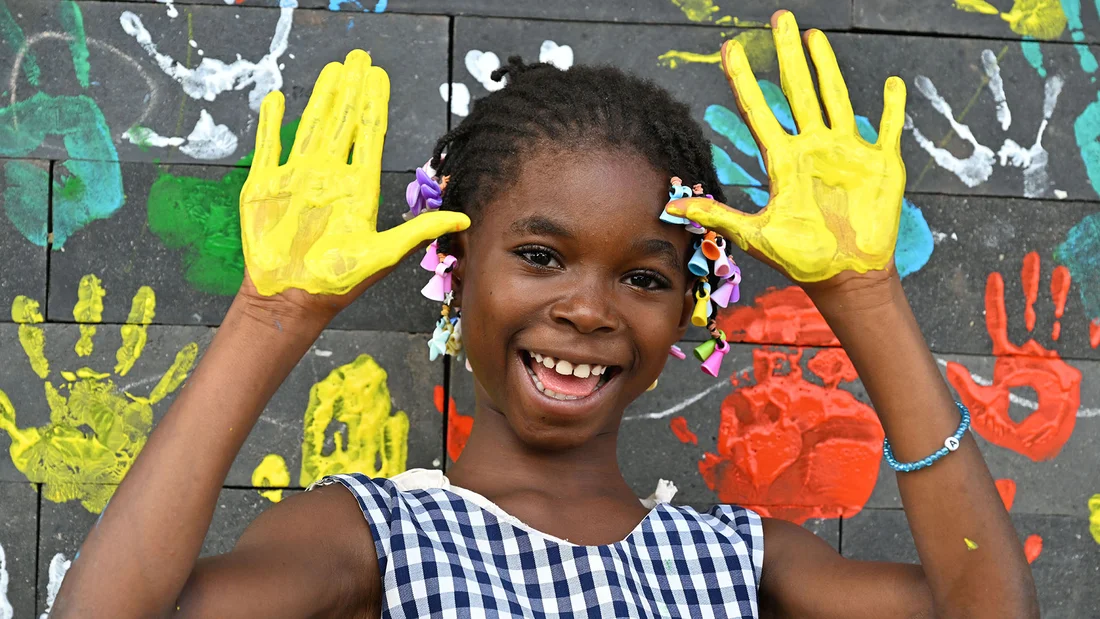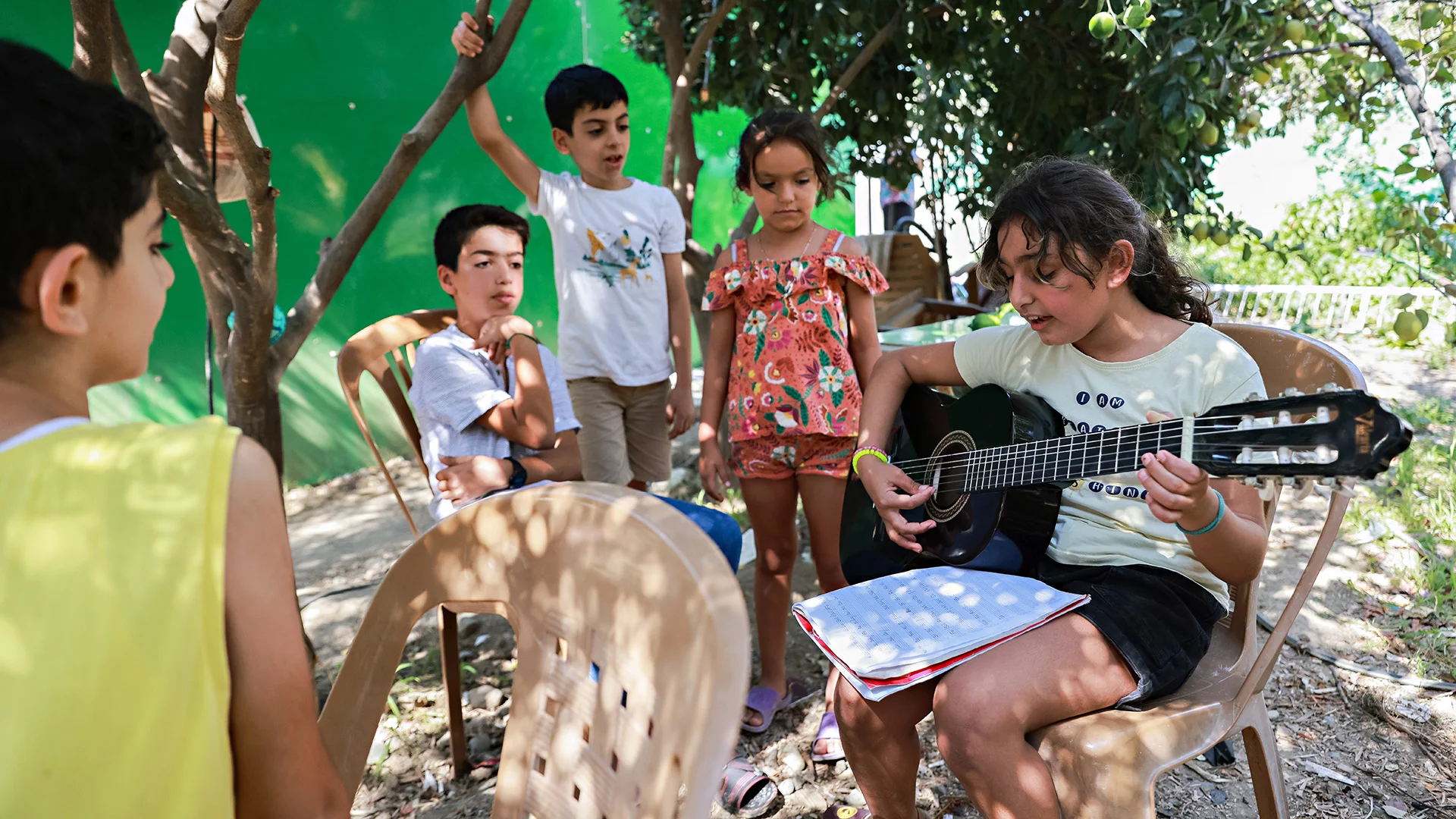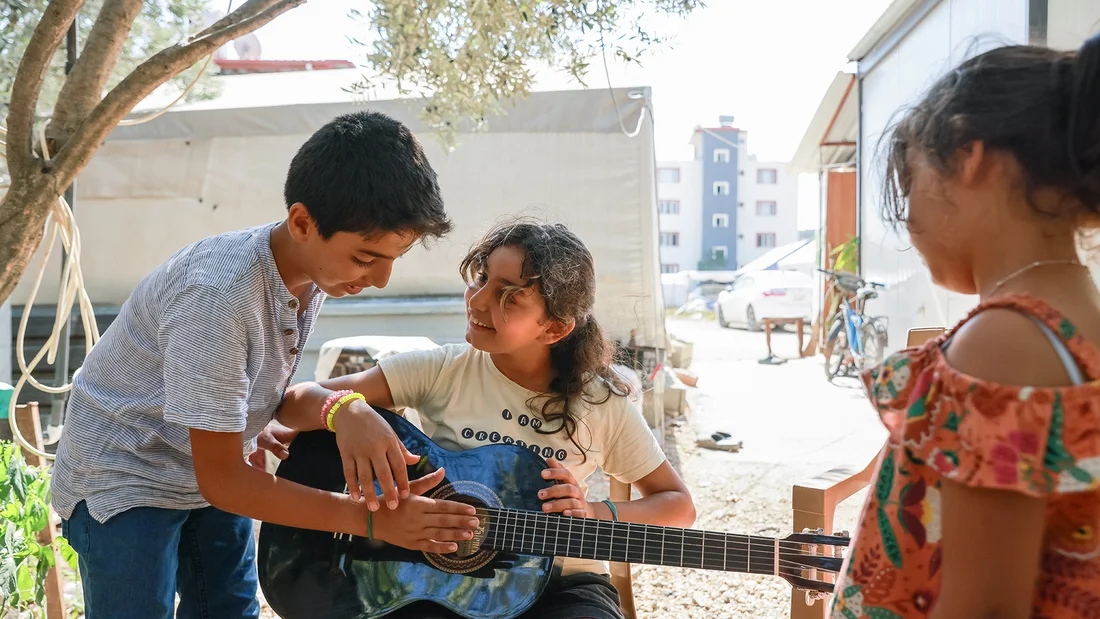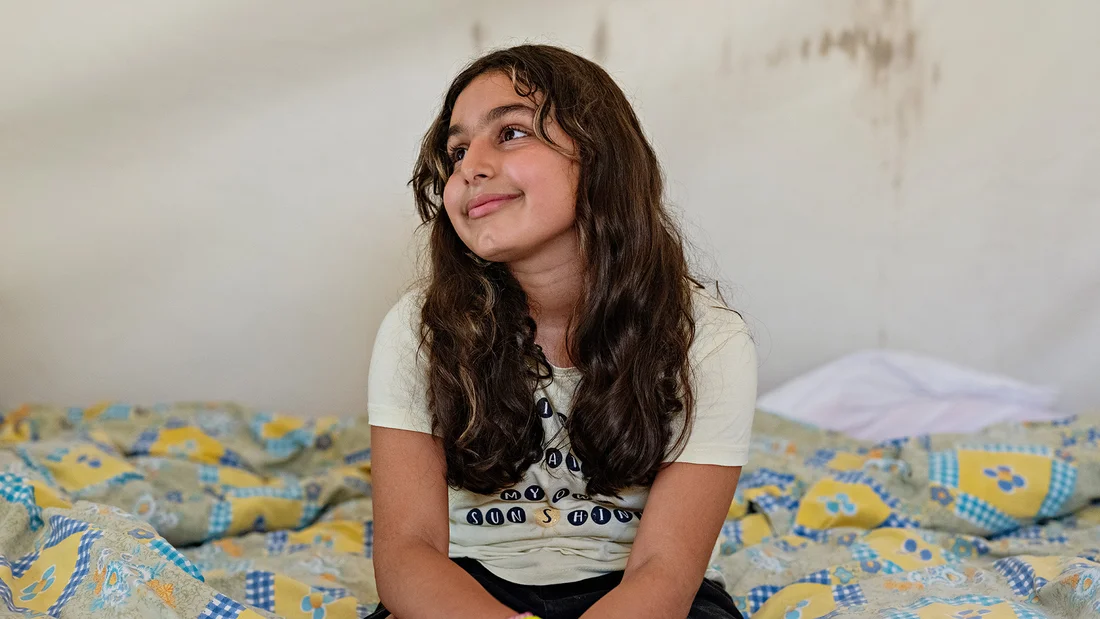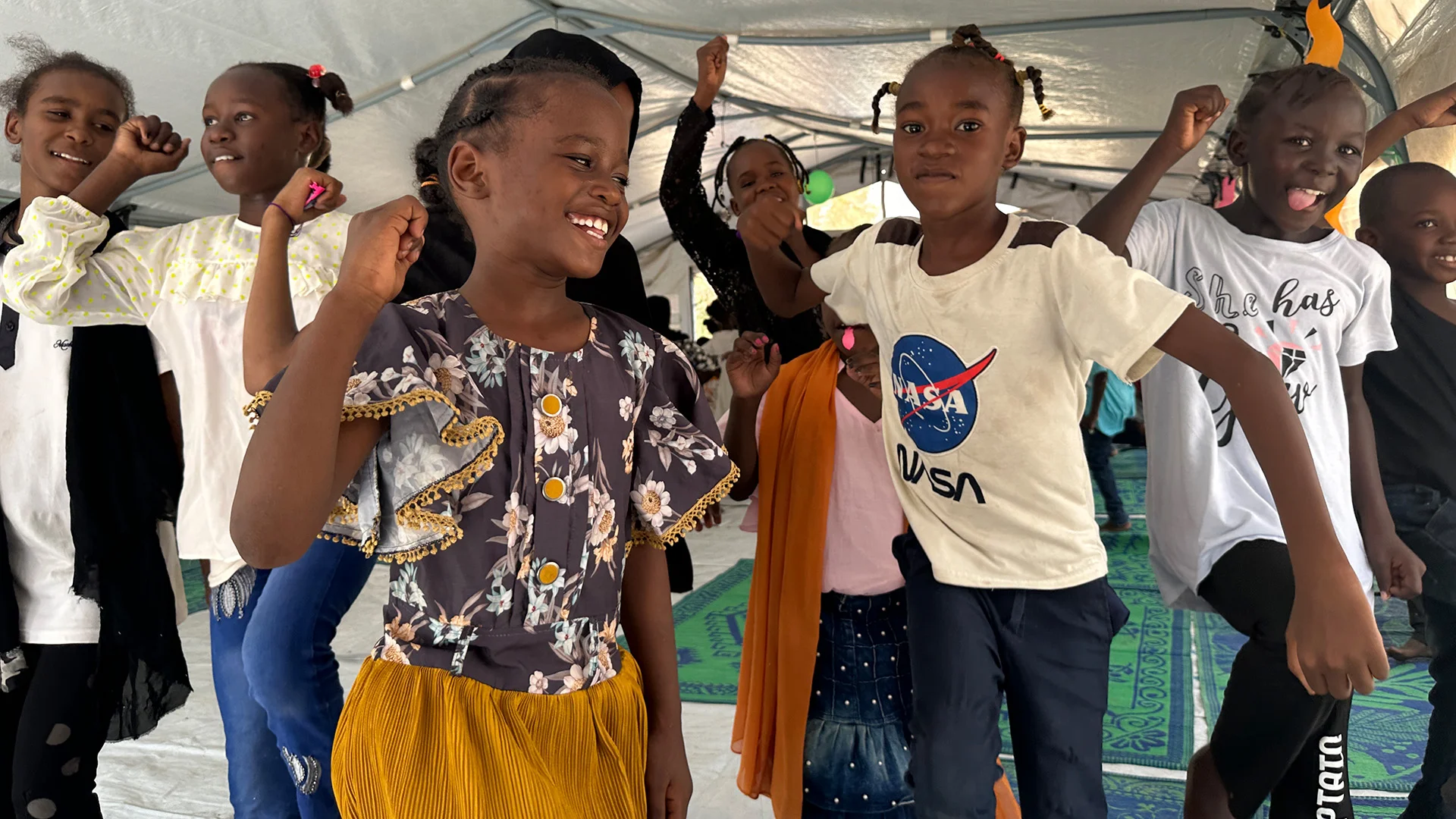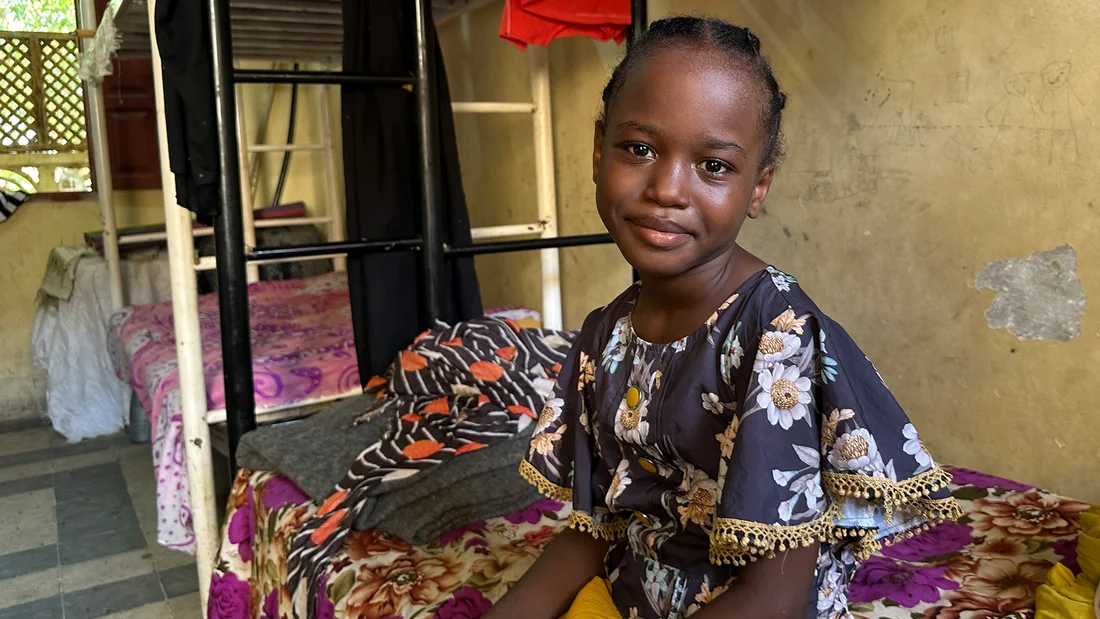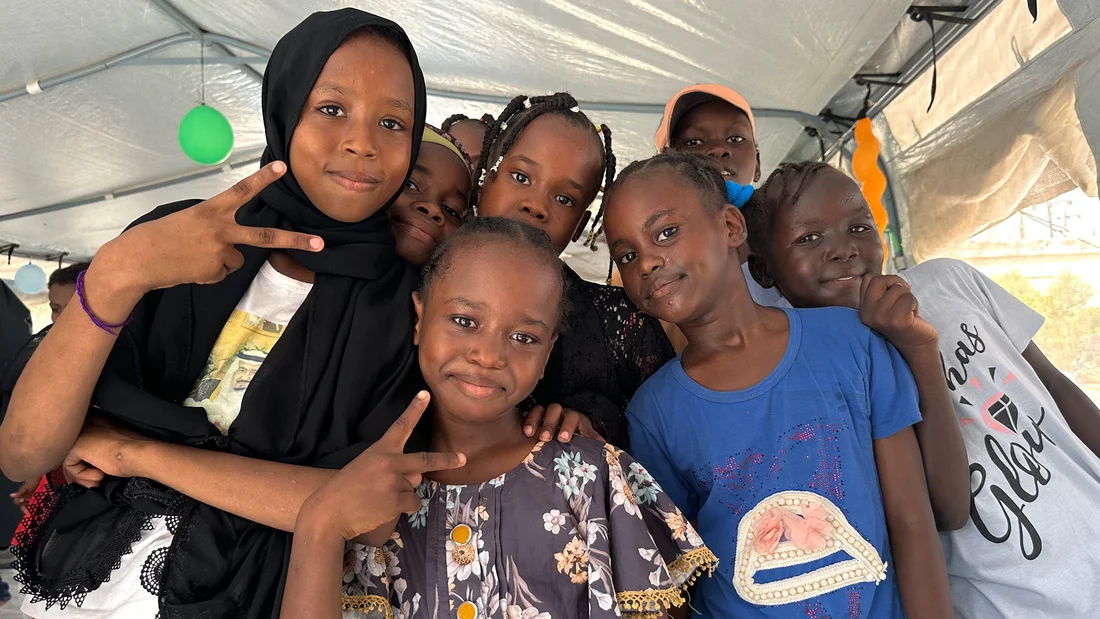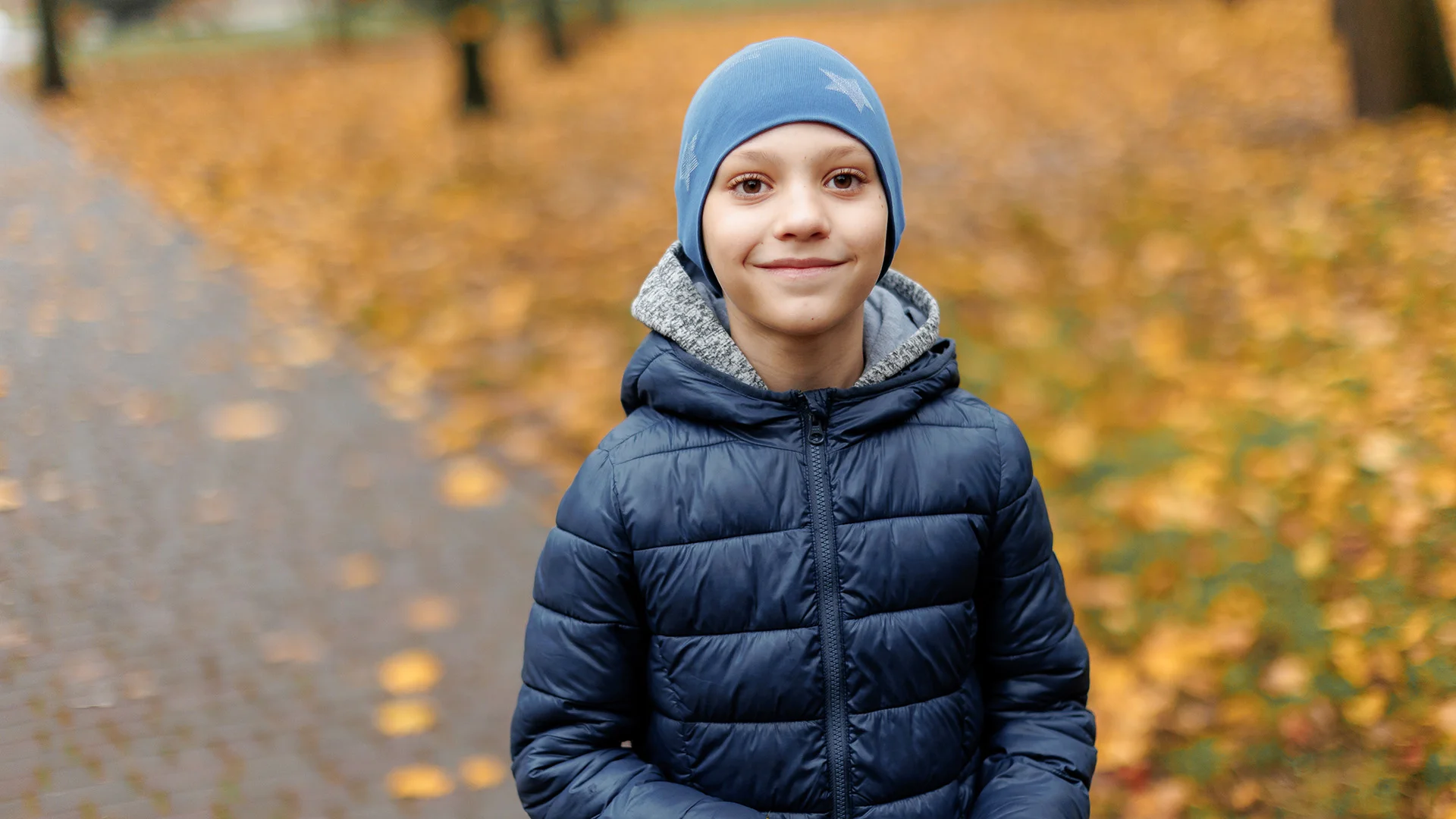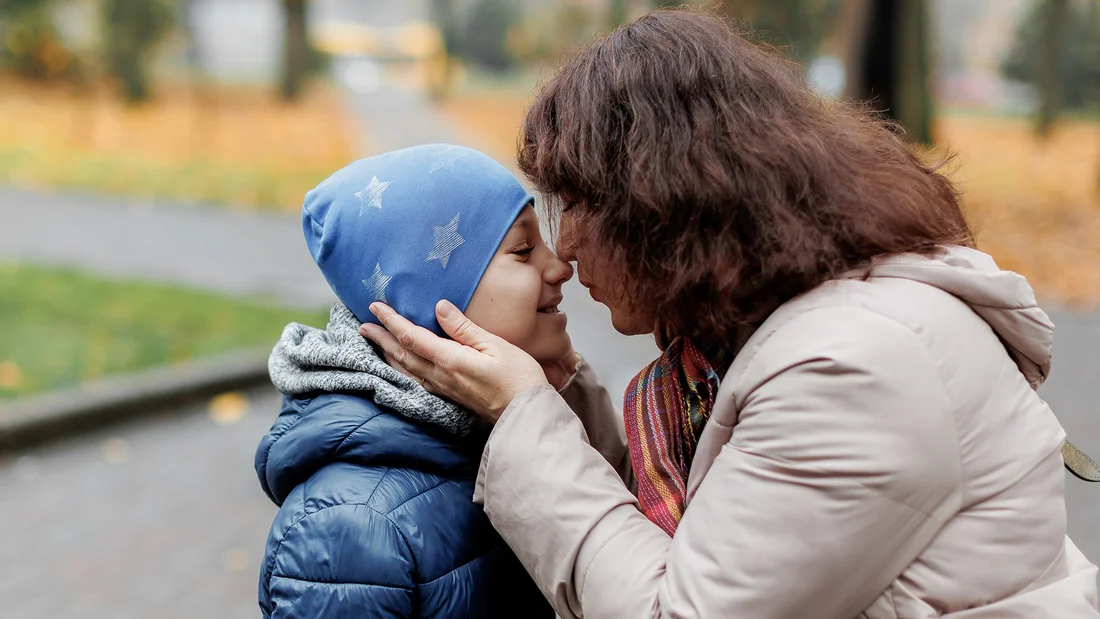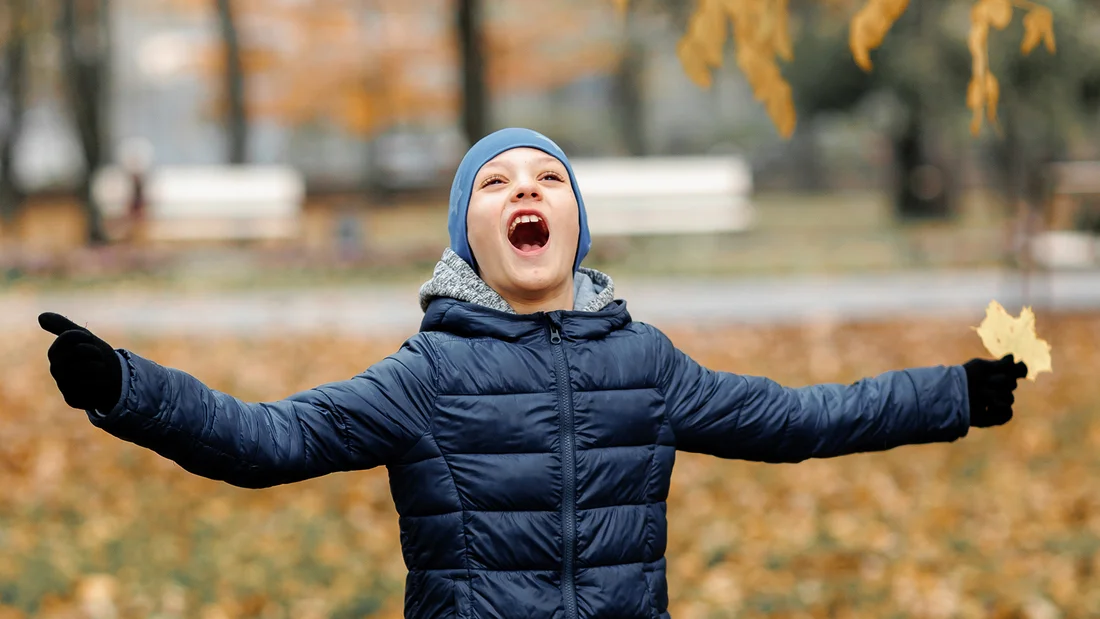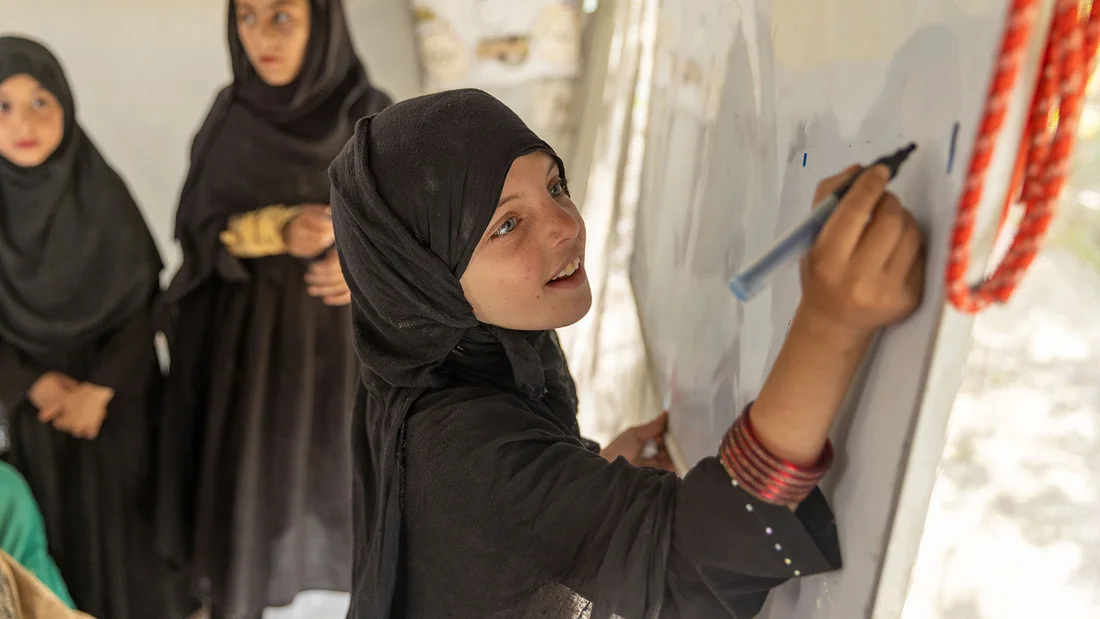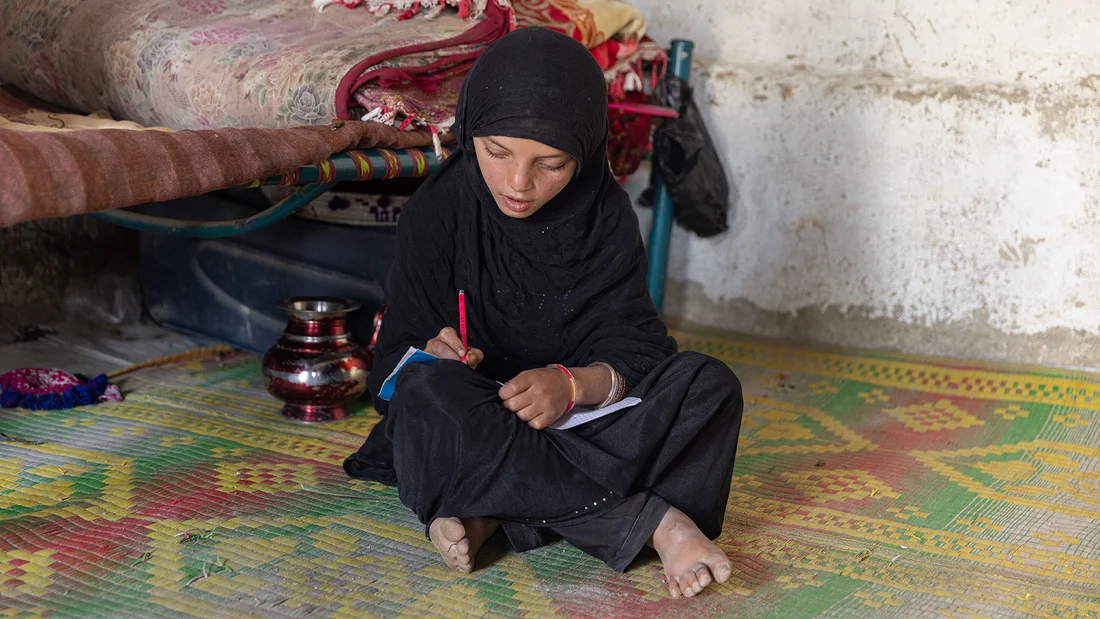Sometimes we need positive stories to make us feel good. Negative headlines often get more attention than positive ones, which is why we’re presenting four inspiring stories here to give our readers hope and lift moods!
Turkey: music as a source of comfort
Every day, we at UNICEF see the resilience of children. Even in the most adverse situations, they manage to find comfort and solidarity through play and connection with other children. In Turkey, ten-year-old Sidra can laugh again, thanks to the opportunity to make music together with her cousins. “I love to share the songs and poems I write with others,” she says.
Sidra is one of many children suffering from the effects of the devastating earthquake in southern Turkey near the Syrian border on February 6, 2023. UNICEF is there on the ground to help the local children and their families.
WASH: through the support of UNICEF
- Around 3.9 million people received access to safe water through water transports, the provision of water purification tablets, water quality testing and repairs to water supply systems
- Over 860,000 people received hygiene materials, including hygiene sets for families, babies and people with special needs
- 1.4 million people were provided with access to sanitary facilities, including toilets, showers and waste services
Education:
- UNICEF supports more than 900,000 children with access to formal and non-formal education, including early childhood education
- Almost 1.1 million children received school materials
Child protection:
- Comprehensive and coordinated psychosocial support is offered to children, young people and families at 47 centers: either through mobile task forces or in specially designated spaces, for example in child friendly spaces. These are safe places where children can play and recover from their traumatic experiences.
- UNICEF, together with the government and other humanitarian partners, provided about 1.2 million children and their caregivers with psychosocial support.
* Reporting period: February 6 (day of earthquake) to October 31, 2023
Sidra is from the city of Antakya in Turkey. She is one of many Turkish children receiving therapeutic support. Sidra’s father was killed in the earthquake, and her mother was severely injured. The family’s house was completely destroyed. Once a week, Sidra attends UNICEF-sponsored therapy sessions to process the loss that she has suffered. Music and art have helped her to work through these traumatic experiences.
On the recommendation of her therapist, Sidra is also taking guitar and drawing lessons. She enjoys playing for her cousins. Her connection to them is proof of the therapeutic and healing power of shared play. Amid all of the challenges, these moments of laughter and joy symbolize hope and resilience. While Sidra copes with the loss of her father and sister, she has hope for the future: “My family is the most important thing in my life, and we are healing together.”
Sudan: dance as therapy
Dancing is fun, and for a moment allows all worries and cares to be forgotten. Abnaa Al-Shamal in Port Sudan is a child friendly safe learning space where children can play together, dance, and simply be children. Eight-year-old Omnia is a regular visitor to the child friendly safe learning space: “I’ve made many new friends here.”
The armed conflict in Sudan has led to the displacement of more than three million children, both within and outside the country’s borders. One of these is Omnia, who grew up in Khartoum, Sudan’s capital. Like many others, she and her family fled the fighting in the northeast and came to Port Sudan. There are now thousands of displaced children and families sheltering there.
WASH: through UNICEF and its partners
- 5.8 million people were provided with access to safe drinking water;
- 170,000 people were provided with access to sanitary facilities
Health: through UNICEF and its partners
- 6.1 million people received medical emergency supplies
- 5.2 million children were screened for malnutrition – 300,000 children received life-saving treatment.
Child protection and education: UNICEF and its partners provided psychosocial support, education, and protection to over 750,000 people at 751 safe learning spaces.
* Reporting period: January 1 to November 30, 2023
Since January 2023, UNICEF has established 751 safe learning spaces to promote and protect the psychosocial well-being of children. Here, children affected by war and displaced from their homes can play, learn, and simply be children. These learning spaces follow a comprehensive approach: children have access to recreational activities, psychosocial support, digital learning, safe water, sanitary facilities and medical assistance.
One of these child friendly learning spaces is Abnaa Al-Shamal, visited by more than 100 children daily, among them eight-year-old Omnia. Before she and her family were forced to leave Khartoum, Omnia loved attending school. In her new home in Port Sudan, she is fortunate to have a safe learning space nearby that she enjoys visiting regularly. She has made new friends here and together they run, laugh, play, sing, and dance. Omnia especially loves dancing and learning. She says, “One day, I’d like to be a doctor!”
Ukraine: psychological support for children with disabilities
Children with disabilities need special stability and support. Nine-year-old Hryhorii from Ukraine is one such child. Although he had to flee his home due to the ongoing war in Ukraine, he has been able to continue with his therapy and learn how to better manage and express his emotions.
Before the war in Ukraine, nine-year-old Hryhorii and his mother Iryna were living a happy life in Kharkiv. In school, Hryhorii was in a special-needs educational program that allowed him to take part in diverse educational activities and achieve his learning goals, despite his limitations. It allowed for changes to the learning environment or adjustments to lesson plans to meet his special needs.
Hryhorii had friends and a sense of stability at his old school, and he had access to regular speech therapy and neuropsychological support services. But in early March 2022, after the war broke out, he and his mother Iryna were forced to flee further inland to Poltava.
Health: UNICEF’s work helped more than 4.8 million women and children receive access to healthcare in 2023.
Education: in 2023, UNICEF helped around 1.2 million children (including almost 600,000 girls and over 2,500 children with disabilities) get access to education.
Child protection: by November 2023, almost 1.5 million children (including over 750,000 girls and around 23,000 children with disabilities) had access to prevention and aid services. 1.3 million of them received psychological and psychosocial support.
UNICEF is also active in neighboring countries, getting basic necessities to refugee families. UNICEF currently services 33 Blue Dots – child friendly spaces where mothers and children can get help – in seven neighboring countries.
* Reporting period: January 1 to November 30, 2023
In his new home in Poltava, through support from UNICEF, Hryhorii could immediately take part in ten free online stabilization and developmental sessions with a Confidence Psychological Assistance Center, an NGO that provides psychological support to children with education-related disabilities in Ukraine’s Poltavska and Sumska regions. There, specialists work to identify risks of developmental disorders in children and refer families to organizations and facilities that offer the services they need. The center also employs psychologists who offer stabilization and development courses for children and parents, both in-person and online. As of November 2023, around 1,200 children and caregivers had received personal consultations as part of this program.
“Hryhorii was anxious, hyperactive and emotionally unbalanced,” says Alisa Lokhmachova, his psychologist at the Confidence Psychological Assistance Center. In the online sessions, Hryhorii learned how to express different emotions with different intensities. Lokhmachova helped him understand how other people feel and raise his emotional intelligence. Each session begins with movement and breathing exercises, followed by lessons for developing emotional intelligence, awareness and memory, and concluding with a relaxation exercise. His mother Iryna is also given suggestions on how she can help and encourage her son at home.
Afghanistan: a place for play and friendship
In the past, children spent hours fetching water and suffered from isolation. Now they can enjoy new friendships and time for family. Young Naghma is one of the many children who play and learn in safety at the child friendly space created by UNICEF in Afghanistan’s Paktika province. “I can laugh here with my friends, we play and read together here,” says Naghma.
Afghanistan has been hit by multiple crises including natural disasters, armed conflict, disease and hunger, and its people are fighting every day for their survival. Among them is Naghma, who lost her father in the devastating earthquake that hit Afghanistan in 2022. Another earthquake struck Afghanistan in 2023. Naghma finds comfort in one of UNICEF’s child friendly spaces. Right after the 2022 earthquake, UNICEF created 24 such spaces in Paktika and Khost. Here, children are surrounded by puzzles, games, coloring books and pencils as well as dozens of other children with whom they can play. “I’ve learned so much here,” says Naghma. “I come here every day with my brother, and we are happy here.”
WASH: UNICEF provided about 1.8 million people with access to safe water and over one million people with access to gender-sensitive and disability-accommodating bathroom facilities.
Education: in 2023, UNICEF helped over 18,000 community-based schools across the country, so that almost 600,000 children – more than half of them girls – can continue their education.
Health: through UNICEF, more than 20 million people had access to health services.
Child protection: thanks to UNICEF and its partners, 3.8 million children and their caregivers have access to psychological and psychosocial support.
* Reporting period: January 1 to November 30, 2023
The child friendly space in Paktika is run by a social worker – one of 30 UNICEF employees deployed last year to help children and families deal with what they’ve experienced. The spaces provide a safe, motivating and healing environment for traumatized children, bringing back a feeling of normalcy to their shattered lives.
“Here, we learn poems and the alphabet and we can paint,” laughs Naghma, “and there are lots of toys.” Every morning, Naghma runs through the door. She can play in peace here and make new friends.
Paktika also gives her a safe space where she can let out her feelings while she deals with her loss. “It makes me sad that we lost our house, and sometimes we still cry about my father,” she admits. But Naghma has become more self-confident. “I got colored pencils and a school notebook, but I’d really like one of these bags,” she says, boldly pointing to a blue UNICEF backpack.
